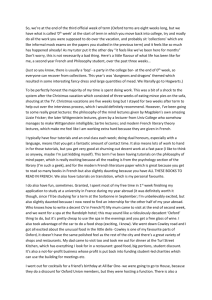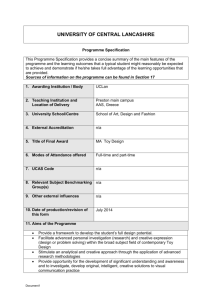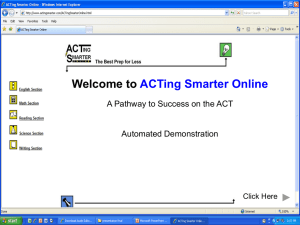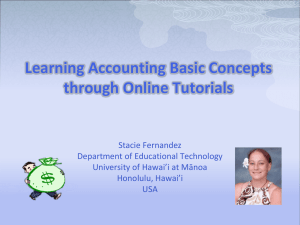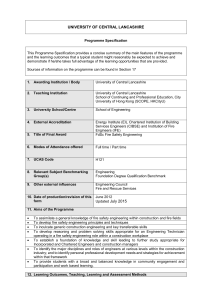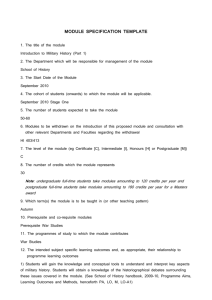course specification. - University of Central Lancashire
advertisement
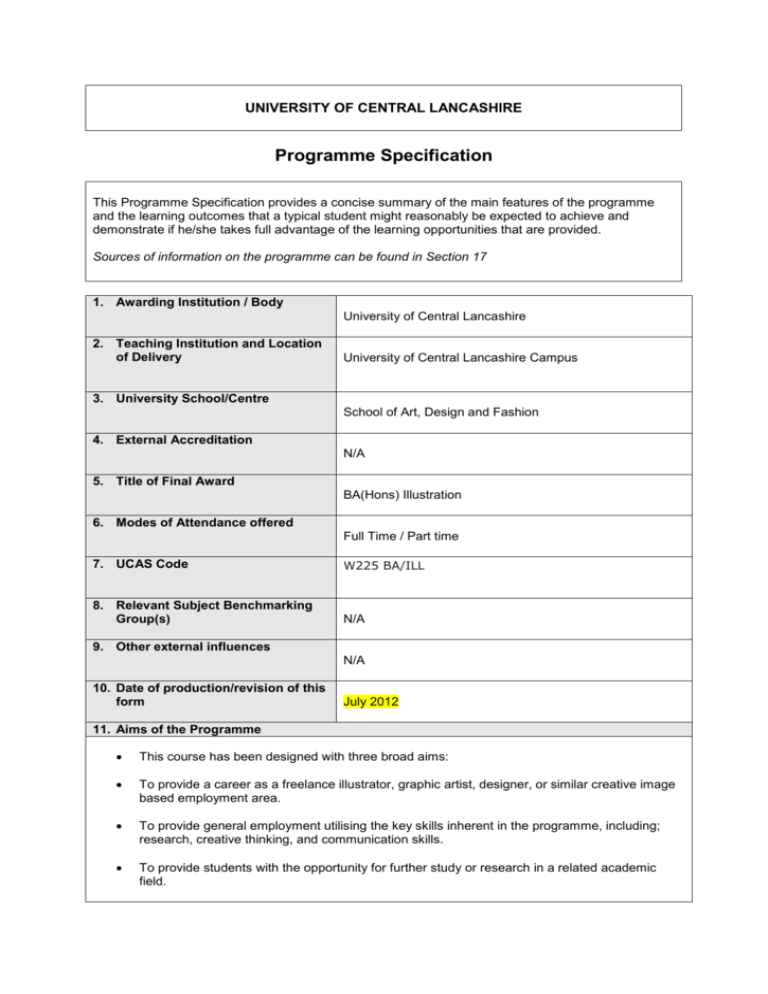
UNIVERSITY OF CENTRAL LANCASHIRE Programme Specification This Programme Specification provides a concise summary of the main features of the programme and the learning outcomes that a typical student might reasonably be expected to achieve and demonstrate if he/she takes full advantage of the learning opportunities that are provided. Sources of information on the programme can be found in Section 17 1. Awarding Institution / Body University of Central Lancashire 2. Teaching Institution and Location of Delivery University of Central Lancashire Campus 3. University School/Centre School of Art, Design and Fashion 4. External Accreditation N/A 5. Title of Final Award BA(Hons) Illustration 6. Modes of Attendance offered Full Time / Part time 7. UCAS Code W225 BA/ILL 8. Relevant Subject Benchmarking Group(s) N/A 9. Other external influences N/A 10. Date of production/revision of this form July 2012 11. Aims of the Programme This course has been designed with three broad aims: To provide a career as a freelance illustrator, graphic artist, designer, or similar creative image based employment area. To provide general employment utilising the key skills inherent in the programme, including; research, creative thinking, and communication skills. To provide students with the opportunity for further study or research in a related academic field. 12. Learning Outcomes, Teaching, Learning and Assessment Methods A. Knowledge and Understanding A1. Appreciation of contemporary illustrative practice. A2. Ability to debate concepts, and techniques using subject specific terminology. A3. Utilise a range of learning resources to obtain information to help them undertake complex tasks within the subject area. A4. Identify their individual creative characteristics and philosophies. Teaching and Learning Methods These activities form the main methods of learning and teaching at all levels on modules DD1101, IL1101, IL1133, IL2101, Il2102, IL2177, IL3111, IL3112, DD3992: Studio based design activity consists of independent research and study, formal and informal lectures, demonstrations, group seminars and tutorials, one to one tutorials, and written feedback. In modules DD1000, DD2000, DD3000 independent research and study, formal and informal lectures, group seminars, one to one tutorials, and written feedback, form the main methods of learning and teaching at all levels. Assessment methods Assessment of DD1101, IL1101, IL1133, IL2101, Il2102, IL2177, IL3111, IL3112, DD3992 is through project work, which includes presentation and verbal critique of each project. Assessment takes place at the end of each module. Assessment of DD1000, DD2000, DD3000 is through visual and written project work with a variety of assessment points outlined in the student handbook. B. Subject-specific skills B1. Develop authorial skills - the ability to initiate concepts and products outside the accepted industrial conventions. B2. Demonstrate visual skills – drawing, a variety of technology and media skills including traditional and computer aided imaging and high quality presentation. B3. Visualise and communicate complex written and verbal concepts, themes and instructions. Teaching and Learning Methods These activities form the main methods of learning and teaching at all levels on modules DD1101, IL1101, IL1133, IL2101, Il2102, IL2177, IL3111, IL3112, DD3992: Studio based design activity consists of independent research and study, formal and informal lectures, demonstrations, group seminars and tutorials, one to one tutorials, and written feedback. In modules DD1000, DD2000, DD3000 independent research and study, formal and informal lectures, group seminars, one to one tutorials, and written feedback, form the main methods of learning and teaching at all levels. Assessment methods Assessment of DD1101, IL1101, IL1133, IL2101, Il2102, IL2177, IL3111, IL3112, DD3992 is through project work, which includes portfolio presentation and verbal critique of each project. Assessment takes place at the end of each module. Assessment of DD1000, DD2000, DD3000 is through visual and written project work with a variety of assessment points outlined in the student handbook. C. Thinking Skills C1. Develop a range of thinking skills and problem solving abilities. C2. Plan and undertake original research utilising appropriate media and techniques. C3. Critically appraise their own work and the work of others verbally and in writing Teaching and Learning Methods These activities form the main methods of learning and teaching at all levels on modules DD1101, IL1101, IL1133, IL2101, Il2102, IL2177, IL3111, IL3112, DD3992: Studio based design activity consists of independent research and study, formal and informal lectures, demonstrations, group seminars and tutorials, one to one tutorials, and written feedback. In modules DD1000, DD2000, DD3000 independent research and study, formal and informal lectures, group seminars, one to one tutorials, and written feedback, form the main methods of learning and teaching at all levels. Assessment methods Assessment of DD1101, IL1101, IL1133, IL2101, Il2102, IL2177, IL3111, IL3112, DD3992 is through project work, which includes portfolio presentation and verbal critique of each project. Assessment takes place at the end of each module. Assessment of DD1000, DD2000, DD3000 is through visual and written project work with a variety of assessment points outlined in the student handbook. D. Other skills relevant to employability and personal development D1. Analyse and solve problems. D2. Develop self- reliance, time- management, decision- making. D3. Learn and work independently in preparation for working in industry. Teaching and Learning Methods These activities form the main methods of learning and teaching at all levels on modules DD1101, IL1101, IL1133, IL2101, Il2102, IL2177, IL3111, IL3112, DD3992: Studio based design activity consists of independent research and study, formal and informal lectures, demonstrations, group seminars and tutorials, one to one tutorials, and written feedback. In modules DD1000, DD2000, DD3000 independent research and study, formal and informal lectures, group seminars, one to one tutorials, and written feedback, form the main methods of learning and teaching at all levels. Assessment methods Assessment of DD1101, IL1101, IL1133, IL2101, Il2102, IL2177, IL3111, IL3112, DD3992 is through project work, which includes portfolio presentation and verbal critique of each project. Assessment takes place at the end of each module. Assessment of DD1000, DD2000, DD3000 is through visual and written project work with a variety of assessment points outlined in the student handbook. 13. Programme Structures 14. Awards and Credits Level Module Code Module Title Credit rating Level 6 IL3111 IL3112 DD3000 Personal Projects External Project Contextual Studies; Design Futures Honours Project Student Initiated Module Student Initiated Module 40 20 20 40 40 20 IL2177 DD3920 DD3910 Experimental Illustration Illustration in Context Contemporary Contextual Studies Exploring Digital Illustration Student Initiated Module Student Initiated Module DD1101 IL1101 DD1000 IL1133 DD1920 DD1910 Creative Thinking Introduction to Illustration Historical Contextual Studies Drawing and Process Student Initiated Module Student Initiated Module 40 40 20 20 20 10 DD3992 DD3920 DD3910 Level 5 Level 4 IL2101 IL2102 DD2000 40 20 10 Bachelor Honours Degree Requires 360 credits including a minimum of 120 at Level 6 and must include the Honours Project. Bachelor Degree Requires 320 credits including a minimum of 80 at level 6 HE Diploma Requires 240 credits including a minimum of 120 at Level 5 or above 20 20 10 HE Certificate Requires 120 credits at Level 4 or above 15. Personal Development Planning PDP is designed to; enable students to work towards their personal and professional goals on graduation; to help students acquire the skills needed for their chosen career; to help students evaluate their strengths and improve on a range of skills necessary both at uclan, and after graduation. The concept of Personal Development Planning (PDP) is introduced to students via the handbook, course specific handbook and induction programme. Students keep a portfolio of work to track their development as an illustrator towards the goals set for themselves in consultation with their personal tutor. The personal tutorial system allows students to discuss their personal development on an individual basis once per semester. In addition personal and professional development issues are identified through frequent project critiques, and detailed by staff through written feedback sheets. Students are encouraged to keep a reflective journal, or sketchbook that identifies practical creative issues and personal and project development. At Level Six students initiate and agree their project briefs with their personal tutor, and fill in a Module Self Assessment form at the end of each module. The system has been piloted at Levels 4, 5 & 6 with at least one self initiated project at each level being initiated and agreed between staff and students, and self assessed. After module assessment students can access a transcript that details their record of achievement. All students on the course are given the opportunity to receive feedback from practicing industry professionals, representatives of the Association of Illustrators, or other creative industry professionals such as publishing professionals. 16. Admissions criteria Programme Specifications include minimum entry requirements, including academic qualifications, together with appropriate experience and skills required for entry to study. These criteria may be expressed as a range rather than a specific grade. Amendments to entry requirements may have been made after these documents were published and you should consult the University’s website for the most up to date information. Students will be informed of their personal minimum entry criteria in their offer letter. UK Applicants: Except in exceptional circumstances, UK applicants must attend an interview with portfolio. Once your application has been processed you will be sent a letter stating the date you that you are required to attend, and what will be required of you If it is not possible for you to attend on the date proposed, please contact us to rearrange a date or agree alternative arrangements. All successful candidates must have achieved the following: Achieve a minimum of 240-300 UCAS tariff points at A2 or equivalent Grade C in GCSE Maths and English or an equivalent; UK equivalents include key skills level 3 or functional skills level 2 European Applicants: European applicants may not be able to attend an interview in the UK. Once your application has been processed, you should submit an e-portfolio, CD or DVD of your recent work; this will be followed by a telephone interview. International Applicants : International applicants may not be able to attend an interview in the UK. Once your application has been processed, you should submit an e-portfolio, CD or DVD of your recent work; this will be followed by a telephone interview. Additionally International students for whom English is not your first language, will be required to evidence an IELTS score of 6.0 or equivalent. Equivalences include: TOEFL Written examination score of 550 plus a test of written English (at 4) TOEFL Computer Equivalent score of 213 and TWE at 4 Proficiency in English (Cambridge) at Grade C or above 17. Key sources of information about the programme Fact Sheet University Website School Website Student Course Handbook University Prospectus 18. Curriculum Skills Map Please tick in the relevant boxes where individual Programme Learning Outcomes are being assessed Programme Learning Outcomes Core (C), Other skills relevant Compulsory to employability and Module (COMP) or Knowledge and personal Level Code Module Title Option (O) understanding Subject-specific Skills Thinking Skills development LEVEL 1 LEVEL 2 LEVEL 3 A1 Note: IL3111 IL3112 DD3000 DD3920 DD3910 DD3992 IL2101 IL2102 Personal Projects External Projects Contextual Studies: Design Futures Student Initiated Module Student Initiated Module Honours Project Experimental Illustration Illustration in Context COMP COMP C O O C COMP COMP DD2000 DD2920 DD2910 DS2177 DD1101 IL1101 DD1000 DD1920 DD1910 DS1133 Contemporary Contextual Studies Student Initiated Module Student Initiated Module Exploring Digital Illustration Creative Thinking Introduction to Illustration Historical Contextual Studies Student Initiated Module Student Initiated Module Drawing and Process C O O O C COMP C O O O A2 A3 A4 B1 B2 x B3 x x x x x X X X X X X X X X X X X X X X X X X x X x X X X X X C3 D1 D2 D3 X x X X C2 x x X X C1 x X X x x x x x X X X X X x X X X X X X X X X X X X X X X X X X X x x x x x x X X x x x X X X x x x x X x x x x x x x x x x x x X X X X X X X X X X X X X X X X X X x x Mapping to other external frameworks, e.g. professional/statutory bodies, will be included within Student Course Handbooks x x

